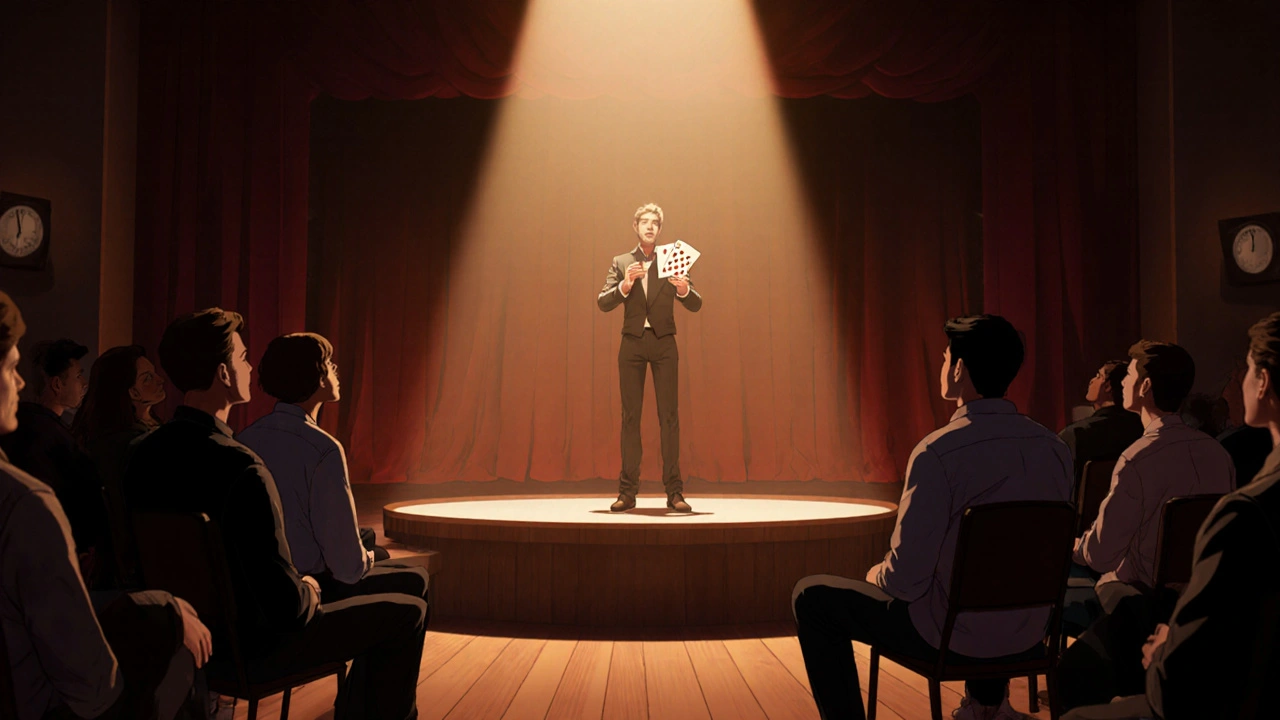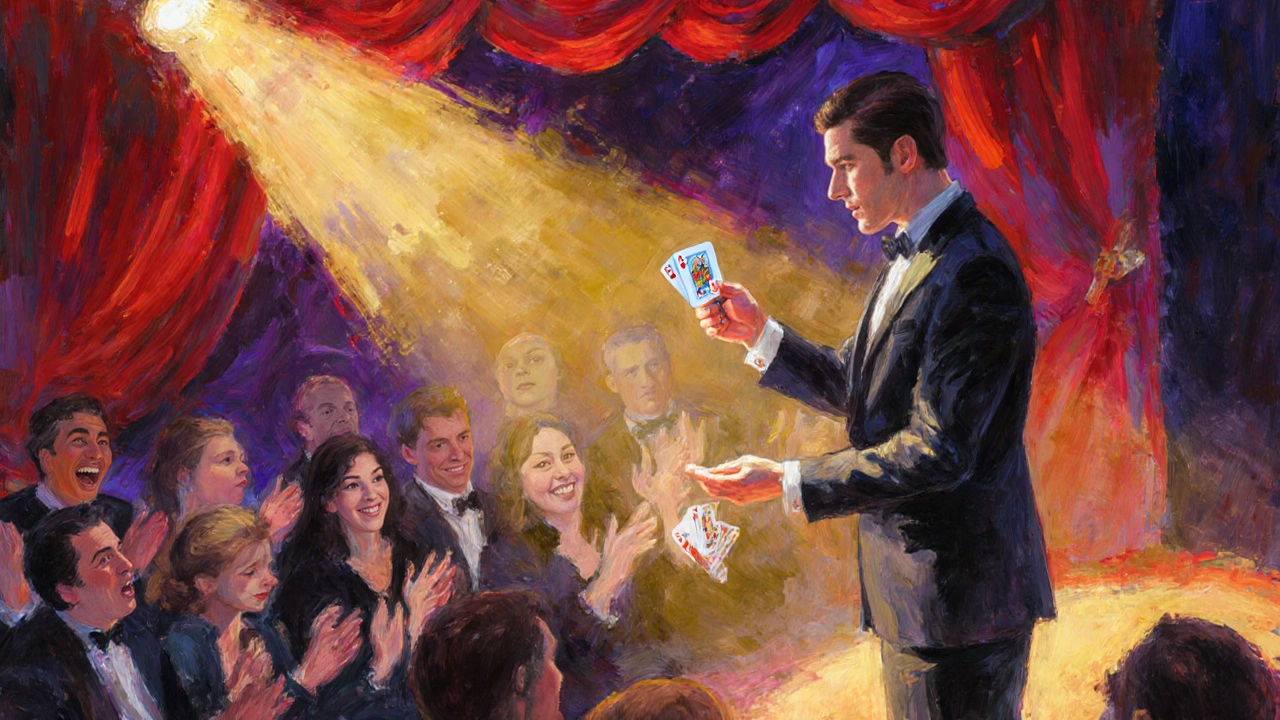Mentalism Course Duration Calculator
How Long Will Your Mentalism Course Take?
Enter your details below to estimate your learning timeline.
Your Estimated Learning Timeline
Ever wondered whether you can master mind‑reading tricks in a weekend or need months of study? The answer isn’t one‑size‑fits‑all, but you can map out a realistic timeline once you know the key variables.
Quick Takeaways
- Typical self‑paced online courses: 4-12 weeks (8-30 hours total).
- Live weekend workshops: 1-3 days (6-12 hours of instruction).
- Intensive bootcamps: 2-4 weeks full‑time (30-60 hours).
- Individual practice adds 2-4 hours per week for steady progress.
- Choose the format that fits your schedule and learning style.
When you sign up for mentalism course is a structured program that teaches you how to create the illusion of mind‑reading, influence, and prediction using psychological techniques and showmanship, the first question most beginners ask is: how long will it take?
Understanding What a Mentalism Course Covers
Mentalism sits at the crossroads of magic, psychology, and performance art. A comprehensive course typically includes:
- Foundational principles of perception, suggestion, and misdirection.
- Core effects such as the Book Test, ESP draws, and prediction routines.
- Presentation skills - timing, storytelling, and audience interaction.
- Ethical considerations and how to maintain credibility.
Because the art blends theory and practice, the total time required depends on two main blocks: instructional hours (what the teacher delivers) and practice hours (what you put in).

Factors That Stretch or Shrink the Timeline
Several elements influence the overall duration of a mentalism course:
- Learning format: Self‑paced video modules let you pause and replay, often extending total calendar time but reducing intensive daily effort.
- Skill level: Complete beginners need more groundwork in basic psychology and confidence, whereas a seasoned magician may skim the fundamentals.
- Practice commitment: Experts suggest 2-4 hours of deliberate practice each week to solidify muscle memory and patter.
- Course depth: Introductory tracks focus on 5-7 signature effects; advanced programs dive into custom routine building and theory, adding weeks.
- Access to feedback: Courses that include live coaching or community critique accelerate learning by correcting mistakes early.
Comparing Common Delivery Methods
| Format | Calendar Length | Instruction Hours | Recommended Practice per Week | Best For |
|---|---|---|---|---|
| Self‑paced online platform | 4-12 weeks | 8-30 hrs | 2-3 hrs | Busy adults, remote learners |
| Live weekend workshop | 1-3 days | 6-12 hrs | 1-2 hrs | Those who thrive on in‑person interaction |
| Intensive bootcamp | 2-4 weeks (full‑time) | 30-60 hrs | 5+ hrs | Aspirants aiming for a quick launch |
The online platform (think Udemy, MasterClass, or dedicated mentalism sites) offers the most flexibility. You can spread the 8‑30 instructional hours over three months while fitting practice into evenings.
A live workshop gives you immediate hands‑on feedback, which can compress learning but requires you to block a few consecutive days.
The bootcamp is the sprint option-ideal if you want to start performing within a month, but it demands full‑time commitment and higher energy.
Choosing the Right Pace for Your Lifestyle
Ask yourself these quick questions:
- How many hours can you realistically dedicate each week?
- Do you prefer learning at your own speed or thriving on real‑time interaction?
- Is a certification or formal credential important for you?
If you can only spare a couple of evenings, the self‑paced route with a certification at the end is a safe bet. If you crave immediate performance opportunities, book a weekend live workshop and plan to keep practicing 2‑3 hours weekly after the event.

Checklist: Planning Your Mentalism Journey
- Identify your desired end‑goal (hobby, stage act, side‑business).
- Pick a format that aligns with your weekly availability.
- Verify the course includes practice recommendations and feedback mechanisms.
- Budget for supplemental resources: decks, scripts, and a community of peers.
- Schedule regular practice sessions (minimum 2 hrs/week).
- Set a milestone - e.g., perform a 5‑minute routine for friends after 4 weeks.
Next Steps After Completing the Course
Finishing the instructional part is just the opening act. To turn knowledge into skill:
- Join a local or online community of mentalists for critique and new ideas.
- Record your performances and review them for timing gaps.
- Gradually expand your repertoire - add one new effect every month.
- Consider a small‑scale public gig (birthday parties, corporate events) to test stage presence.
- Refresh your learning with advanced modules or specialty workshops.
Remember, the true metric isn’t the calendar weeks but the consistency of practice and the confidence you build on stage.
Frequently Asked Questions
What is the shortest way to learn basic mentalism?
A weekend live workshop covering 5 staple effects can give you a functional routine in 6‑12 instructional hours, provided you practice an additional 2‑3 hours afterward.
Do I need a psychology background for mentalism?
No, but a basic understanding of perception, suggestion, and memory (often covered in the first module) helps you explain why tricks work and makes your performance more believable.
How many practice hours are typical per week?
Most instructors recommend 2‑4 hours of deliberate practice each week. Faster learners who can do 5+ hours may finish an intermediate course in half the calendar time.
Is a certification worth it?
A certificate can signal commitment to potential clients or event organizers, especially if you market yourself as a professional performer. It’s not required for hobbyists.
Can I combine multiple formats?
Absolutely. Many learners start with a self‑paced online module for basics, then attend a live workshop for feedback, and finally enroll in a short bootcamp to polish a full‑length act.


NIKHIL TRIPATHI
October 5, 2025 AT 18:40Honestly, the biggest factor isn’t the format you pick but how consistently you put in the practice hours. If you can spare 2‑3 hours a week and actually focus on the core effects, the self‑paced route will get you performing in a month or so. I’d suggest logging your sessions, maybe using a simple spreadsheet, so you can see progress and spot weak spots. Also, joining a community‑forum can give you quick feedback, which trims down trial‑and‑error. The weekend workshops are great for that live interaction, but they’re pricey, so weigh the cost against the benefit.
Shivani Vaidya
October 7, 2025 AT 03:20In regard to the foregoing exposition, it is pertinent to acknowledge that the delineated instructional hours constitute merely a framework; the true mastery is predicated upon diligent rehearsal and iterative refinement. One might consider allocating a fixed temporal window each week, thereby fostering habitual engagement. Moreover, the acquisition of adept presentation skills warrants equal emphasis alongside technical proficiency. Consequently, a judicious synthesis of structured learning and autonomous practice emerges as the optimal paradigm.
Rubina Jadhav
October 8, 2025 AT 11:16Practice a little every day and you’ll improve.
sumraa hussain
October 9, 2025 AT 19:13Yo, mentalism isn’t just about clever tricks – it’s a psychological dance, a mind‑bending performance that makes people question reality!!! If you binge‑watch the video modules, pause at every “Aha!” moment, then actually try the move, you’ll lock it in faster than you think!!! The key is to treat each practice session like a mini‑show, even if you’re alone in your room – the energy you pour in translates to audience perception!!!
Raji viji
October 11, 2025 AT 03:10Let me break this down for you in plain, flamboyant terms: First, you think you can become a mentalist by scrolling through a few YouTube videos, but reality bites – you need structured instruction, not just random meme‑filled tutorials. Second, the guide’s numbers are a baseline; they’re not a guarantee, because most beginners flop without real‑world feedback. Third, if you pick the bootcamp, be prepared to surrender your social life for a fortnight – you’ll be living on coffee and mind‑games. Fourth, the weekend workshop sounds fun, but those six hours are packed with dense theory, so you’ll leave with a sore brain and a shallow repertoire. Fifth, self‑paced courses are a double‑edged sword: they grant flexibility but also lure you into procrastination, so set hard deadlines or you’ll never finish. Sixth, practice isn’t optional; it’s the lifeblood – two to three hours weekly is the minimum, but if you want to stand out, push for five or more. Seventh, community critique accelerates growth exponentially; don’t isolate yourself like a hermit. Eighth, certification? It’s a nice badge, but the real currency is a polished routine that can wow a crowd. Ninth, combine formats for the best of all worlds – start online, then attend a workshop for hands‑on correction, and perhaps finish with a bootcamp sprint. Tenth, budget for props – a good deck, a notebook, maybe a subtle microphone for voice‑over tricks. Eleventh, record your performances; playback reveals timing flaws you never notice live. Twelfth, schedule a small gig at a friend’s party; live pressure is the ultimate test. Thirteenth, keep a log of each effect’s success rate – numbers guide improvement. Fourteenth, never stop learning; the field evolves with new psychological insights. Fifteenth, confidence is king – wear your suit, own the stage, and the audience will buy your illusion.
Rajashree Iyer
October 12, 2025 AT 11:06Ah, the dance of perception and suggestion – where the mind’s eye meets the magician’s intent. One might argue that time, in this craft, is both a teacher and a tyrant; it tempers the novice, yet it also grants the seasoned artist the freedom to explore deeper currents. The paradox lies not in the weeks counted, but in the quality of the moments spent in introspection and rehearsal. Hence, let us not be bound by calendars alone, but by the richness of experience harvested within each practice session.
Parth Haz
October 13, 2025 AT 19:03Hey folks, just wanted to add a hopeful note – no matter which path you choose, consistency is your biggest ally. Set a realistic weekly goal, maybe two hours, and stick to it. Celebrate small wins, like nailing a single effect, and you’ll see momentum build. Remember, the journey itself is rewarding; each practice session sharpens not only skill but confidence.
Vishal Bharadwaj
October 15, 2025 AT 03:00Ok, let’s get real – these “average timelines” are a joke. Most people can’t even finish the first module before quitting, so any 4‑12 week claim is pure fluff. The only thing that matters is dedication, not the fancy charts. If you think a weekend workshop makes you a pro, you’re delusional. And don’t get me started on “certificates” – they’re just paper to put on a wall while you keep flopping on stage.
anoushka singh
October 16, 2025 AT 10:56Honestly, I skimmed the guide and thought it was a bit overkill – a few tricks and some practice should be enough for casual fun. No need to invest weeks if you just want to wow friends at parties.
Jitendra Singh
October 17, 2025 AT 18:53Just a quick thought: if you can carve out an hour on a weekday, you’ll finish the basics faster than trying to cram a whole weekend.
Madhuri Pujari
October 19, 2025 AT 02:50Wow, another “comprehensive guide” that pretends a mentalism bootcamp is a stroll in the park!! 😂 If you’re waiting for a magic wand to appear after 2 weeks, keep dreaming – reality demands sweat, not sparkle!!